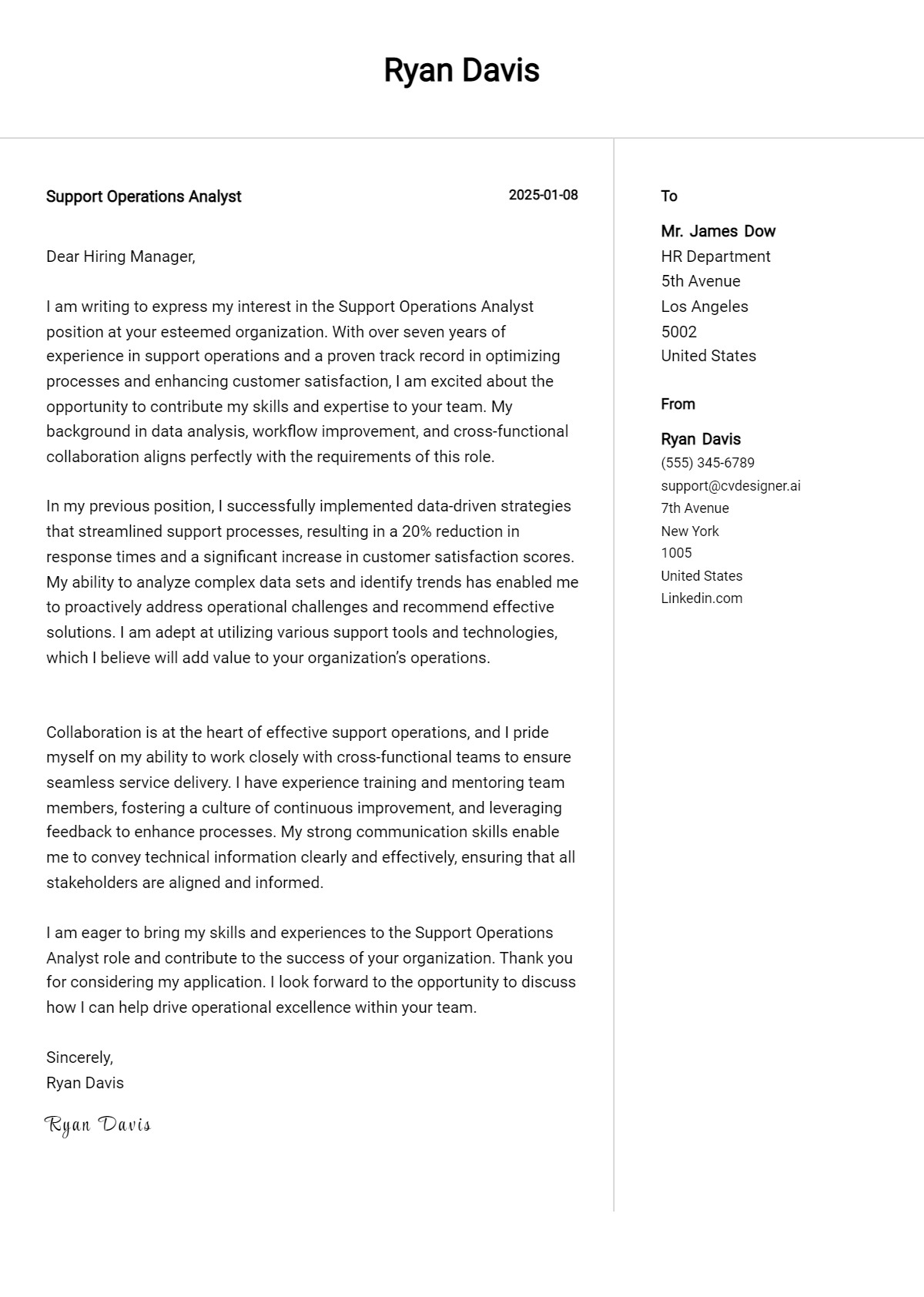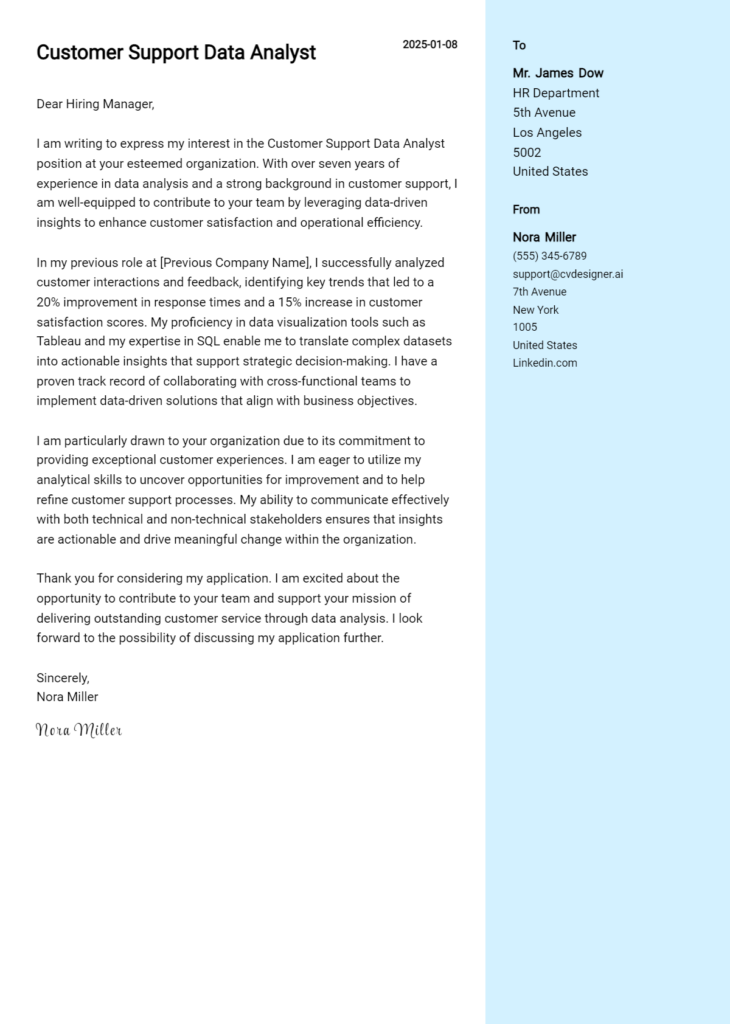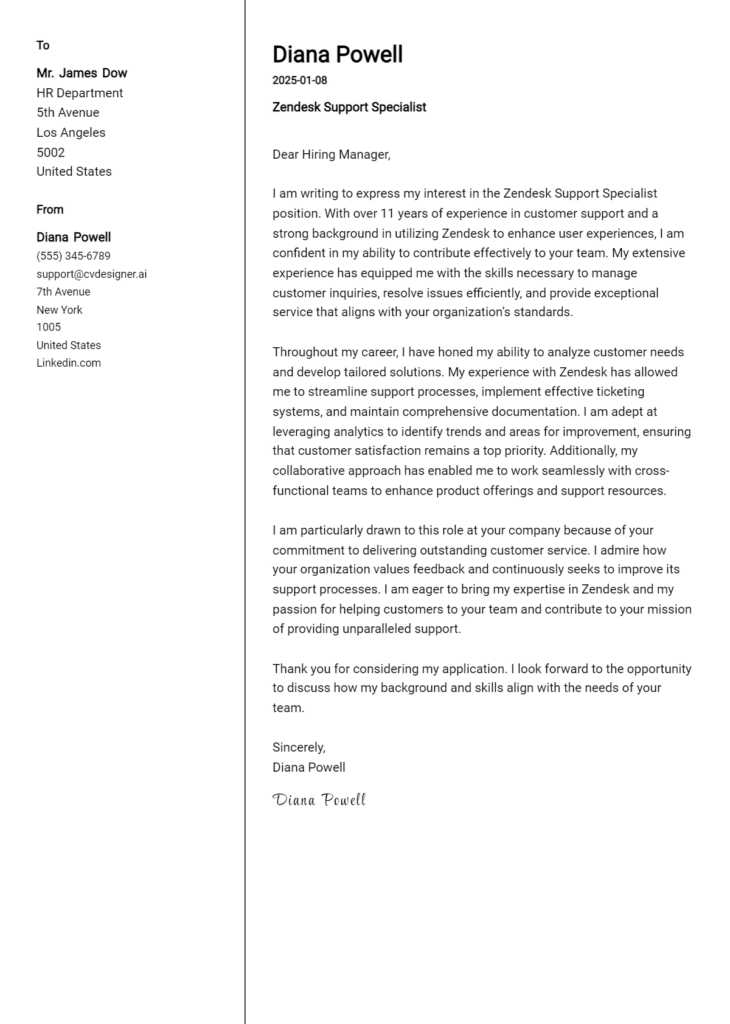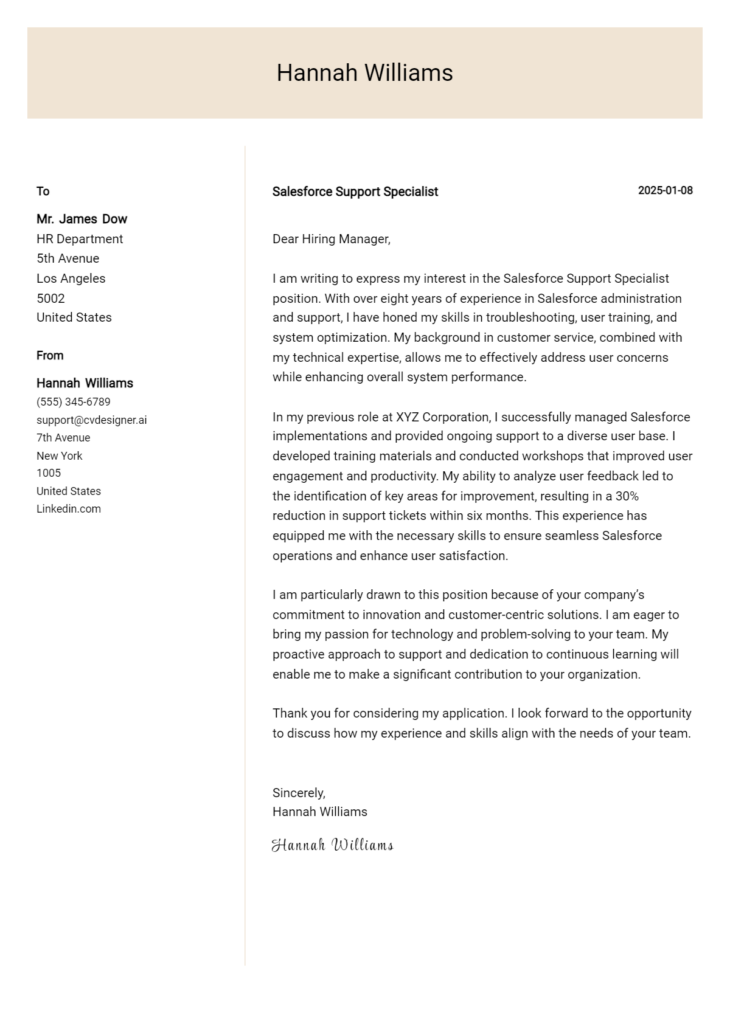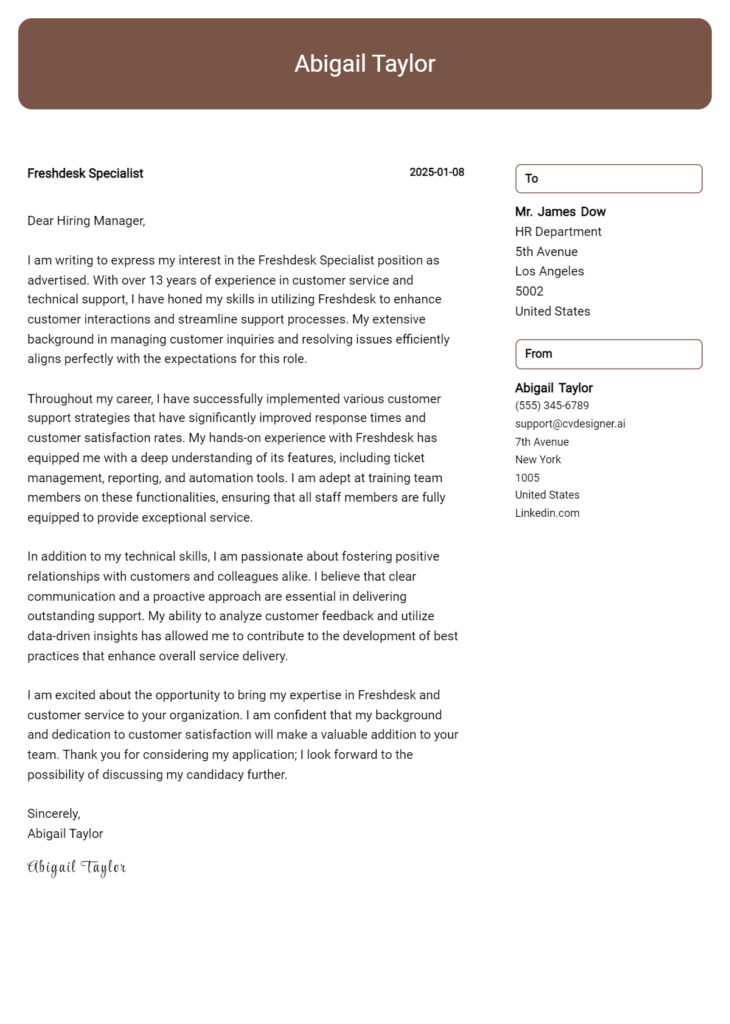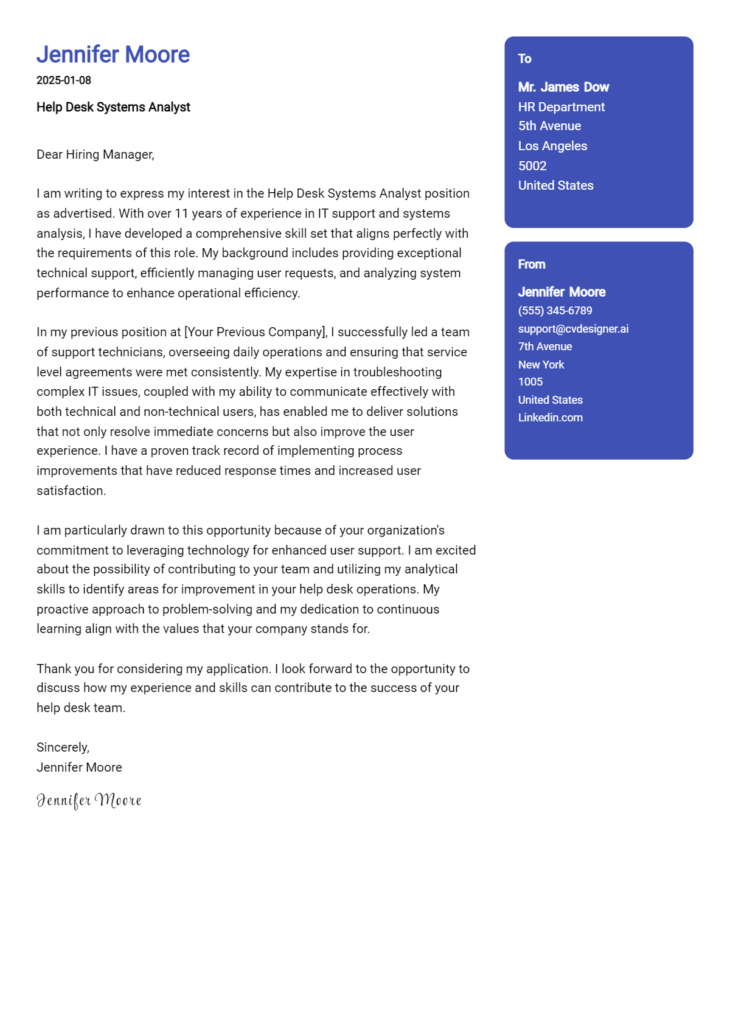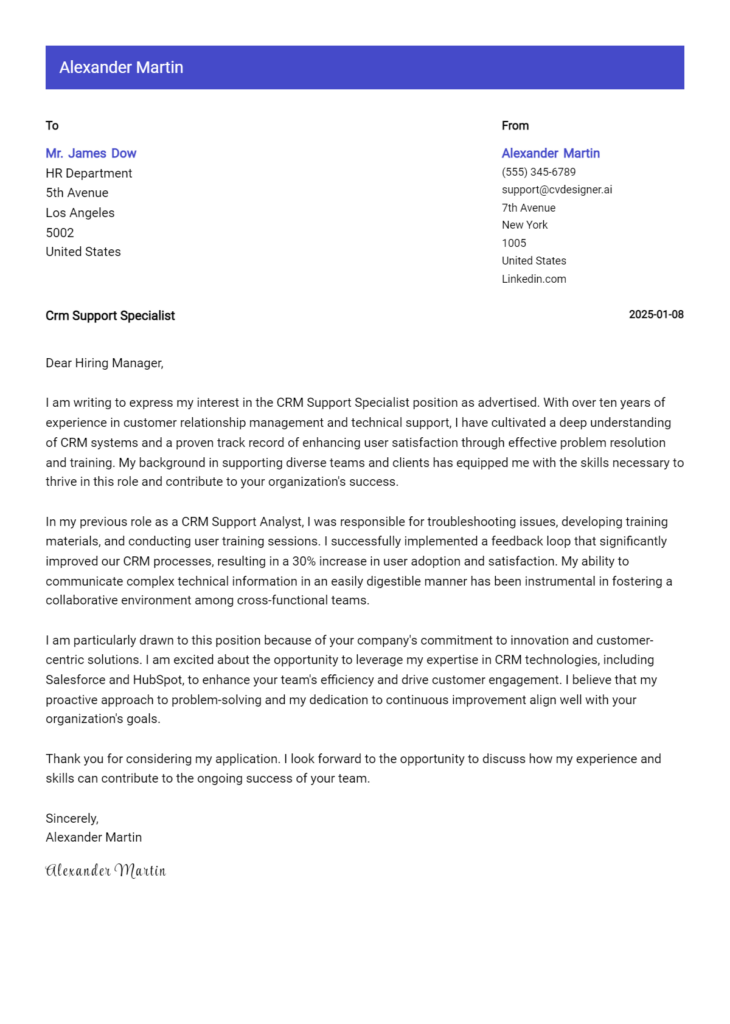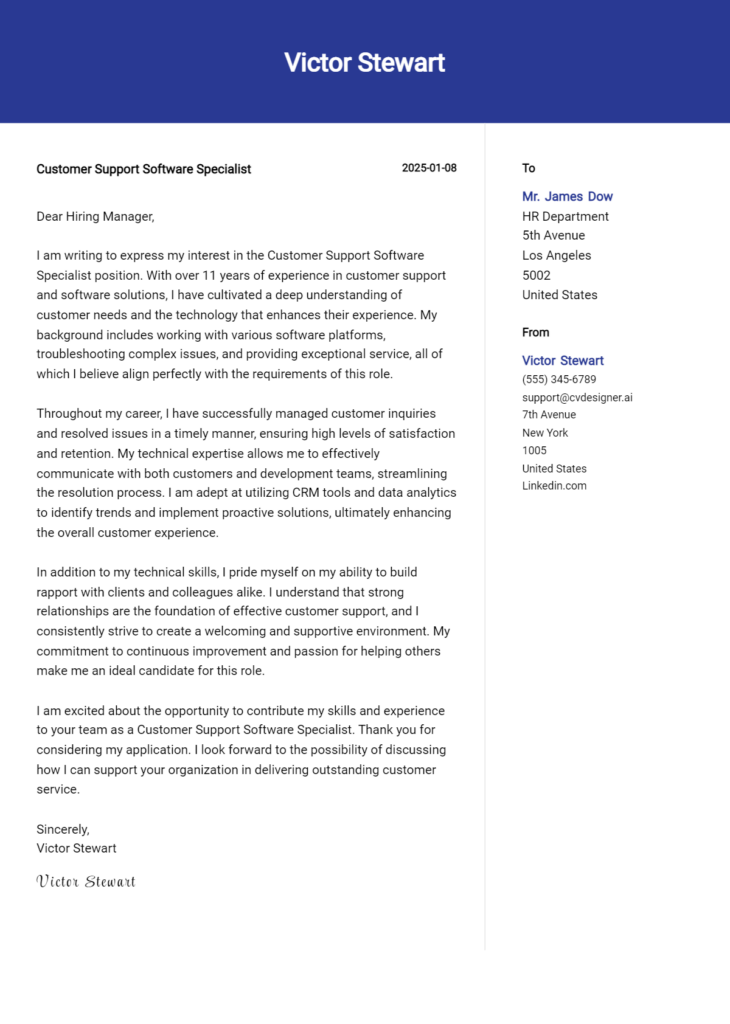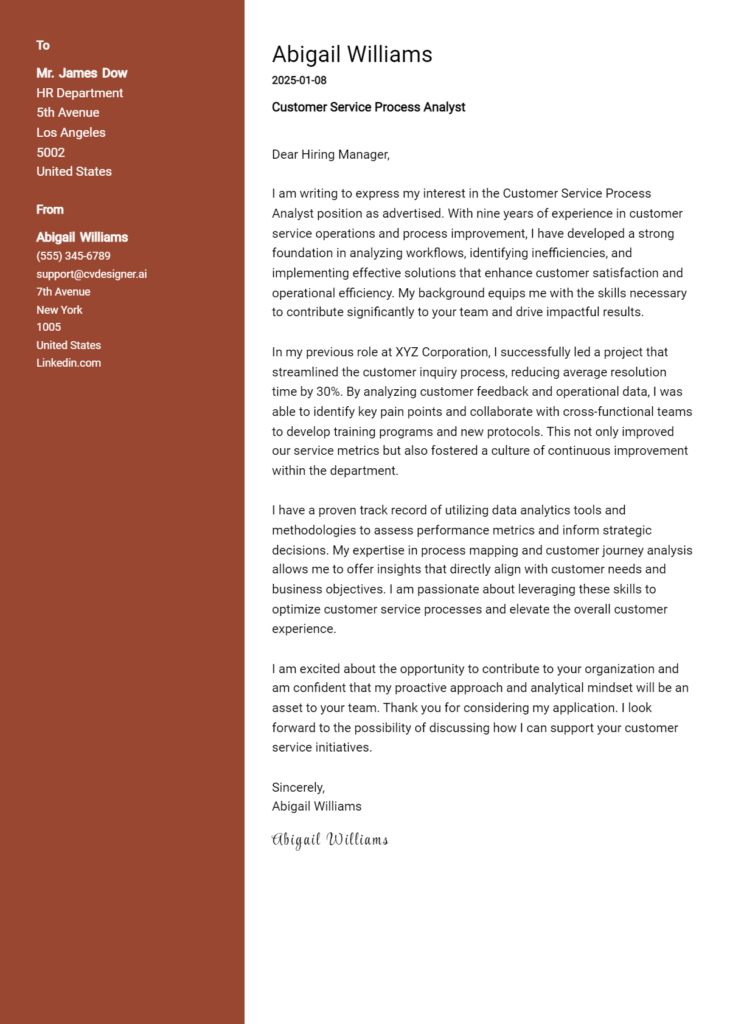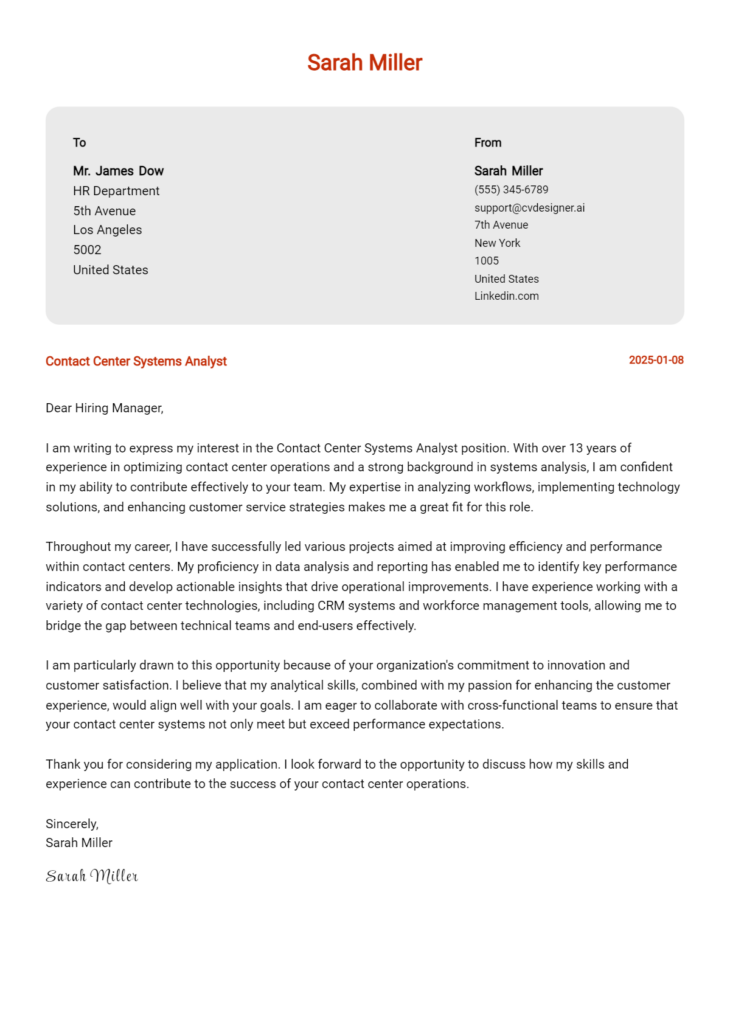Support Operations Analyst Cover Letter Examples
Explore additional Support Operations Analyst cover letter samples and guides and see what works for your level of experience or role.
How to Format a Support Operations Analyst Cover Letter?
Crafting a well-structured cover letter is essential for a Support Operations Analyst, as it not only conveys your qualifications but also reflects your organizational skills and attention to detail. A carefully formatted cover letter can significantly enhance your chances of capturing the hiring manager's interest, showcasing your analytical capabilities and problem-solving mindset—traits that are vital in support operations.
In this guide, we’ll explore the key components of a professional cover letter, specifically tailored for a Support Operations Analyst.
We will cover:
- Cover Letter Header
- Cover Letter Greeting
- Cover Letter Introduction
- Cover Letter Body
- Cover Letter Closing
Each section is crucial in presenting your skills and professionalism. Let’s delve into each part to ensure your cover letter stands out in the competitive job market.
Importance of the Cover Letter Header for a Support Operations Analyst
The cover letter header is a critical component of your application as a Support Operations Analyst. It serves as the first impression to potential employers and sets the tone for the rest of your communication. A well-structured header should include your contact information, the date, and the recipient's details. Clarity and professionalism are essential, as this section conveys your attention to detail and respect for the hiring process. A strong header provides a clear pathway for employers to reach you, while a weak header may leave them confused or unimpressed.
Strong Example
John Doe 123 Main Street Cityville, State, Zip Code johndoe@email.com (123) 456-7890 [Today’s Date] Hiring Manager Company Name 456 Business Rd. Business City, State, Zip Code
Weak Example
Hey, This is John. Please read my letter!
The Importance of a Strong Cover Letter Greeting
The greeting of your cover letter serves as the first impression for the hiring manager and sets the tone for the remainder of your application. A well-crafted greeting demonstrates professionalism and personalizes your approach, allowing you to establish a connection with the reader right from the start. By addressing the hiring manager directly, you convey respect and a genuine interest in the position. To avoid generic greetings, take the time to research the recipient's name and title; this small effort can significantly enhance your cover letter's impact.
Here are some examples of strong and weak greetings for a Support Operations Analyst cover letter:
Strong Greeting Example
Dear Ms. Johnson,
Weak Greeting Example
To Whom It May Concern,
The Importance of a Strong Cover Letter Introduction for a Support Operations Analyst
A well-crafted cover letter introduction is essential for any aspiring Support Operations Analyst. This initial paragraph is your first opportunity to capture the hiring manager's attention and make a lasting impression. It should convey your genuine interest in the role while succinctly highlighting your relevant skills or achievements that align with the job requirements. A compelling introduction not only sets the tone for the rest of your cover letter but also establishes your credibility as a candidate who understands the intricacies of support operations.
Strong Example
Dear [Hiring Manager's Name], I am excited to apply for the Support Operations Analyst position at [Company Name], as I have a deep passion for optimizing support processes to enhance customer satisfaction. With over five years of experience in data analysis and a proven track record of implementing solutions that reduced response times by 30%, I am confident in my ability to contribute effectively to your team. My strong analytical skills and commitment to continuous improvement align perfectly with [Company Name]'s mission to deliver exceptional support services.
Weak Example
To Whom It May Concern, I am writing to apply for the Support Operations Analyst job. I have some experience in data analysis and think I could do well in this role. I hope to learn more about the position and how I can contribute to your company.
Purpose of the Cover Letter Body for a Support Operations Analyst
The cover letter body for a Support Operations Analyst serves as a critical platform for candidates to articulate their unique skills, relevant experiences, and the value they bring to the prospective company. This section should highlight specific projects or accomplishments that demonstrate the candidate's ability to improve operational efficiency, enhance customer satisfaction, or support data-driven decision-making. By illustrating how previous roles have prepared them for the challenges of the Support Operations Analyst position, candidates can effectively position themselves as strong contenders for the role.
Strong Example
I am excited to apply for the Support Operations Analyst position at [Company Name]. In my previous role at [Previous Company], I successfully led a project that streamlined our ticketing system, reducing response times by 30% and increasing customer satisfaction scores by 15%. By analyzing support data and identifying key bottlenecks, I implemented a new workflow that not only improved team efficiency but also enhanced the overall customer experience. My experience with tools such as Zendesk and my analytical skills equip me to contribute effectively to your team and drive operational improvements.
Weak Example
I am interested in the Support Operations Analyst position at [Company Name]. I have worked in customer service for a few years and have experience with different software. I think I can help your team because I like working with people and solving problems. I am not sure about any specific projects, but I believe I could learn quickly on the job.
Importance of the Cover Letter Closing for a Support Operations Analyst
The closing paragraph of a cover letter is crucial for leaving a lasting impression on potential employers. It should effectively summarize your qualifications, reiterate your enthusiasm for the Support Operations Analyst role, and encourage the hiring manager to take the next steps, such as reviewing your resume or scheduling an interview. A strong closing can reinforce your fit for the position and express your eagerness to contribute to the team, while a weak closing may leave the reader uninterested or uncertain about your candidacy.
Strong Example
Thank you for considering my application for the Support Operations Analyst position. With my background in data analysis and a proven track record of improving operational efficiency, I am excited about the opportunity to contribute to your team. I am eager to bring my skills in problem-solving and customer support to [Company Name]. I look forward to the possibility of discussing my application further and am available for an interview at your earliest convenience. Please feel free to review my resume for more details on my qualifications.
Weak Example
That's all I have to say. I hope you look at my resume and consider me for the job. Thank you for your time.
These tips will help candidates craft an effective cover letter for a Support Operations Analyst position. A well-structured cover letter is essential for standing out in a competitive job market. It should effectively showcase your technical skills, problem-solving abilities, familiarity with the Software Development Life Cycle (SDLC), teamwork capabilities, and a genuine passion for continuous learning. By highlighting these aspects, you can demonstrate your suitability for the role and make a positive impression on potential employers.
Tips for Writing a Cover Letter for a Support Operations Analyst
Highlight Technical Skills: Begin your cover letter by detailing your technical expertise relevant to the role. Mention specific tools and technologies you are proficient in, such as ticketing systems, database management, or programming languages. Providing examples of how you've applied these skills in past roles can make your application more compelling. Consider using cover letter templates to format this section effectively.
Showcase Problem-Solving Abilities: Employers value candidates who can think critically and solve complex problems. Use your cover letter to describe a specific challenge you faced in a previous role and the steps you took to resolve it. This not only shows your analytical skills but also demonstrates your ability to remain calm under pressure.
Demonstrate Knowledge of the SDLC: As a Support Operations Analyst, understanding the Software Development Life Cycle is crucial. Briefly explain your experience with each phase of the SDLC and how you have contributed to projects or collaborated with development teams. This shows that you are not only familiar with the processes but can also enhance team productivity.
Emphasize Teamwork and Collaboration: Highlight your ability to work well in teams, as this role often requires collaboration with various departments. Share instances where you successfully worked with others to achieve common goals. Mention any cross-functional projects you were part of, as this emphasizes your adaptability and interpersonal skills.
Express a Passion for Continuous Learning: The tech landscape is ever-evolving, so demonstrating a commitment to continuous learning is vital. Mention any relevant courses, certifications, or workshops you've pursued to improve your skills. This not only shows your dedication to personal growth but also your willingness to adapt to new challenges.
By incorporating these tips into your cover letter, you can create a compelling narrative that showcases your qualifications for the Support Operations Analyst role. If you need assistance getting started, consider utilizing a cover letter builder to streamline the process.
Common Mistakes to Avoid in a Support Operations Analyst Cover Letter
Avoiding common mistakes in your cover letter is crucial for making a strong impression as a Support Operations Analyst. Many candidates overlook key elements that can significantly enhance their application. Here are some common pitfalls and tips on how to avoid them:
Generic Content: Failing to customize your cover letter for the specific role can make it seem impersonal. Always tailor your letter to the job description and company culture.
Lack of Specific Examples: Not providing concrete examples of your accomplishments can weaken your case. Use metrics and specific situations to showcase your skills effectively.
Ignoring Format: Poor formatting can distract from your message. Adhering to a professional cover letter format ensures clarity and readability.
Spelling and Grammar Mistakes: Typos can undermine your professionalism. Always proofread and consider using tools or a second pair of eyes to catch errors.
Overly Lengthy Letters: A cover letter that is too long may lose the reader's attention. Aim for a concise and focused message, ideally one page in length.
Neglecting the Closing: Failing to include a strong closing statement can leave your letter feeling incomplete. Summarize your enthusiasm for the role and invite further discussion.
Omitting a Call to Action: Not including a call to action can leave your letter flat. Encourage the hiring manager to reach out for an interview or express your desire to discuss your application further.
For further guidance, you can check out various cover letter examples that illustrate how to avoid these common mistakes and present your qualifications effectively.
Cover Letter FAQs for Support Operations Analyst
What should I include in my cover letter for a Support Operations Analyst position?
In your cover letter, highlight your relevant experience in support operations, data analysis, and problem-solving skills. Mention specific tools and technologies you are proficient in, such as CRM software, SQL, or Excel. Showcase your understanding of customer service principles and how you have successfully implemented process improvements in previous roles. Additionally, provide examples of how your analytical skills have contributed to solving operational challenges. It’s also beneficial to express your enthusiasm for the company and the specific role, demonstrating that you’ve researched the organization and understand its goals.
How can I tailor my cover letter for each application?
To tailor your cover letter, start by carefully reading the job description and identifying key skills and qualifications the employer is seeking. Use these keywords to align your experiences with the role. Mention the company’s mission or recent initiatives and explain how your background aligns with them. Additionally, include specific examples from your work history that demonstrate your ability to meet the needs outlined in the job description. Personalizing your cover letter not only shows your genuine interest but also sets you apart from other candidates.
How can I demonstrate my analytical skills in the cover letter?
To effectively demonstrate your analytical skills in your cover letter, provide concrete examples of how you have used these skills in previous roles. Discuss specific projects where you analyzed data to identify trends or solve problems. For instance, you might mention a time when you improved a support process based on your data analysis, leading to enhanced efficiency or customer satisfaction. Highlight any tools you used, such as data visualization software or statistical analysis methods. This not only showcases your analytical capabilities but also illustrates your contributions to past employers.
Should I mention my soft skills in the cover letter?
Yes, mentioning soft skills in your cover letter is critical, especially for a Support Operations Analyst role where communication and teamwork are essential. Highlight skills such as problem-solving, adaptability, and interpersonal communication. Provide examples of how you’ve successfully collaborated with cross-functional teams, handled customer inquiries, or resolved conflicts. For instance, you might describe a scenario where your communication skills helped facilitate a solution during a challenging support issue. By illustrating your soft skills alongside your technical abilities, you present a well-rounded candidacy that emphasizes your suitability for the role.
Build your Cover Letter in minutes
Use an AI-powered cover letter builder and have your letter done in 5 minutes. Just select your template and our software will guide you through the process.

